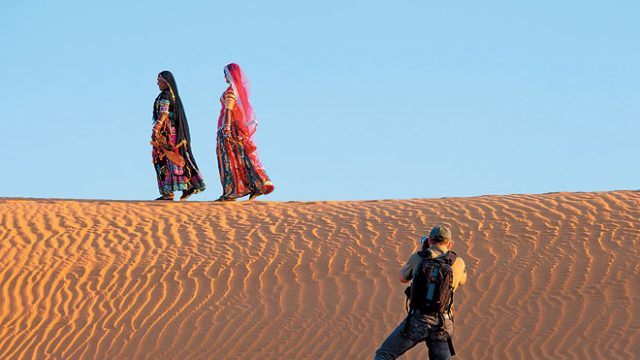I had always wanted to visit Ladakh,” says Rahul Mathur, Delhi-based creative director with a multinational ad agency. “I’m not too sure where I first heard about Sankar’s photography expedition, but I knew I had to be a part of it the moment I did, especially since he had planned it for the winter, an unheard-of time to visit.” Ladakh exceeded Mathur’s expectations, but what made it truly memorable was “Sankar’s almost Wikipedic knowledge of the place, people and landscapes.” Photography tours, it may be said, add another dimension to the way we think and see when we travel.
It was serendipity and the excuse to travel more that impelled Sankar Sridhar (www.sankarsridhar.com) to launch his photography tours. Emailed by a London-based gentleman in 2011 to help him with an itinerary because he wanted to visit India and make images like the ones Sridhar had on his site, the ace photographer was persuaded to conduct photography workshops since some of his pictures could only be taken because he had spent years travelling with nomads and had their implicit trust. He was initially reluctant because he preferred solo travel, but “it [the photo tour] was absolutely fantastic with everyone loving the immersive experience.” Thus was born www.travelshooters.com.
Bengaluru-based Darter Photography (www.darter.in), co-founded by Arun Bhat and Shreeram MV, who now lead tours to over 25 destinations, first introduced Hampi in January 2011. Their wildlife photo tours explore the rainforests of the Western Ghats (Agumbe, Amboli, Goa), the grasslands of Kutch and Tal Chapar, and the deciduous jungles of central (Bandhavgarh, Kanha, Tadoba) and southern India (Bandipur and Nagarhole). “Travel is a great teacher, especially to the photographer, and photographers learn and grow by interacting with other photographers,” says Shreeram. Darter added Myanmar to its portfolio last year, they are heading to Cambodia this year, and Africa is coming up next.
Sujoy Das (www.sujoydas.com, www.southcol.com), who has been trekking and photographing the Himalaya for over 30 years, set up South Col Expeditions in 2007. “It is essentially a one-man outfit (me!) with a special interest in the Himalaya, so far.” South Col’s tours have been to places like Ladakh (Markha Valley, Rumtse to Tso Moriri, Lamayuru to Padum), Sikkim (the Green Lakes trek) and Nepal (Everest Base Camp and Gokyo Valley, which rate among the top ten mountain photography destinations in the world). Even camera enthusiasts already in possession of excellent skills sign up for expert help (say, photography inside a monastery, which might not be possible without local contacts) and technical knowhow (‘how to shoot the Milky Way at night’). “I do a lot of photo treks in Nepal as they have good infrastructure like wi-fi, points for charging camera batteries, and tea houses with hot meals, even in remote places like the Everest Base Camp,” says Das, who has been involved in fundraising and relief work after the earthquake of April 25.
Destinations headlined by photography tours satisfy two crucial criteria, mainly—abundant photo opportunities and unique travel experiences. “One of our earliest tours was to Agumbe—and it’s immensely popular to this day,” Shreeram says. “This is not conventional wildlife photography—here, the wildlife we photograph is mostly in smaller forms, including snakes, frogs, insects and crabs. Again, people don’t associate Kutch and the Andamans with wildlife. In fact, the abundance of wildlife in these places has always left our guests stunned.”
Sridhar, who has taken groups to both sides of the Zoji La in Kashmir, and to Himachal, Rajasthan, Gujarat, Bengal, Nagaland and Arunachal (apart from Ladakh, of course), says he likes to select a balanced mix of landscapes and experiences for group tours so that no one is disappointed and everybody has the chance to dabble in a kind of photography they might not otherwise have taken seriously. He says participants have “all been immensely patient, since I prefer letting a situation develop, rather than forcing one for the sake of an image.” Group sizes don’t exceed eight although, since 2013, Sridhar has also been customising tours for one or at most two people, that is, “serious photographers who don’t mind roughing it out a bit for the stories they want to tell.” The diversity of folk who sign up, aged anywhere from 20 to 70, always delights tour leaders. Shreeram says, “The conversations have sometimes kept us awake all night!”
Is it all win-win, then? “Well, I would like to stay longer in certain locations that are extremely photo-rich, but this isn’t always possible with time constrints,” says Das. For example, an Everest Base Camp photo trek has to be completed within two weeks, so groups usually move to a new location each day. Sridhar really wishes we could do away with the photographynot- allowed rule at so many places in India. He also finds ‘poverty’ or ‘misery’ photography of impoverished people in developing countries abhorrent. Since most of his work is with communities living in remote areas, who can’t access things most of us take for granted, he tries to help. “The biggest positive is that, thanks to the tours, I am in a position to give back—whether books and schoolbags for children or things that help families.”
India is, in fact, on many top photo tour lists worldwide, right up there with Alaska in the US, the Amalfi Coast in Italy, the Ngorongoro crater in Tanzania, Galapagos off Equador, and Vietnam and Cambodia, making Indian photo tours an amazing, pocket-friendly way to explore the subcontinent. Mathur explains, “Sankar would point you in the direction and yet enable you to make the discovery on your own, in your own manner. He was professor and student, guide and tourist, expert and friend. And that best sums it up: a photographic holiday where the photos were of the place, but the story in the photographs was our own.”




